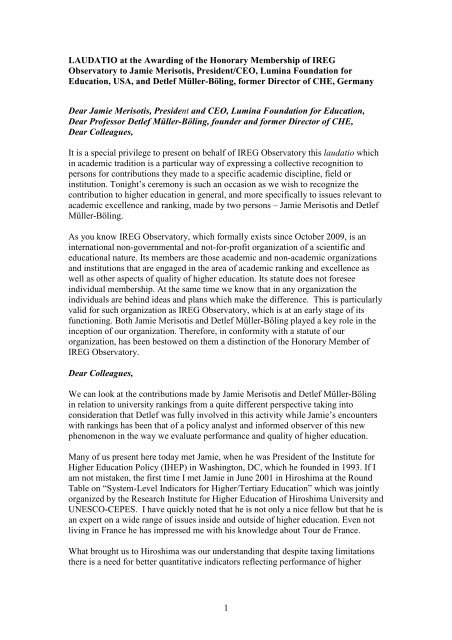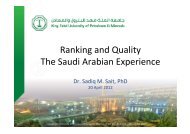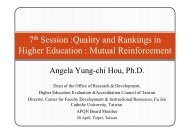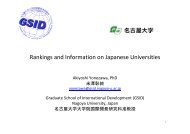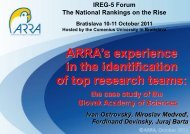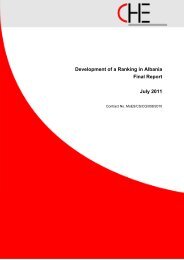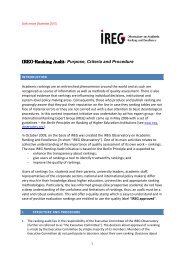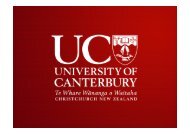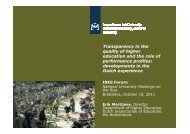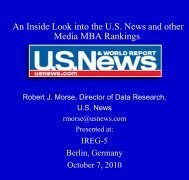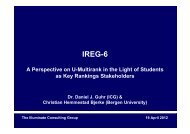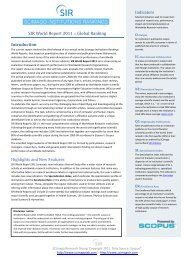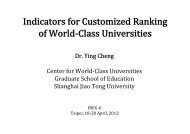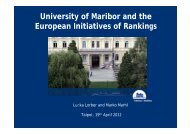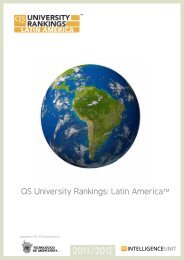Download .pdf - International Observatory on Academic Ranking ...
Download .pdf - International Observatory on Academic Ranking ...
Download .pdf - International Observatory on Academic Ranking ...
You also want an ePaper? Increase the reach of your titles
YUMPU automatically turns print PDFs into web optimized ePapers that Google loves.
educati<strong>on</strong> at the instituti<strong>on</strong>al, system-wide as well as internati<strong>on</strong>al level. It is at thattime that rankings have brought our attenti<strong>on</strong>.In his introductory remarks presented at the meeting c<strong>on</strong>vened by the Council forHigher Educati<strong>on</strong> Accreditati<strong>on</strong> <str<strong>on</strong>g>Internati<strong>on</strong>al</str<strong>on</strong>g> Commissi<strong>on</strong> in January 2006 in SanFrancisco, Jamie explains his interest in rankings in the following way:“I come to the dialogue about rankings with a good deal of skepticism abouttheir ability to serve as effective indicators of instituti<strong>on</strong>al quality. But I thinkit’s fair to say that whether or not colleges and universities agree with thevarious ranking systems and league tables findings is largely irrelevant.<strong>Ranking</strong> systems clearly are here to stay. As a result, I’ve come to thec<strong>on</strong>clusi<strong>on</strong> that it is important to learn all that we can about how theseranking system work, and to provide a framework for those who do ranking sothat they can improve and enhance their methodologies.”It was this last observati<strong>on</strong> which most likely motivated Jamie to involve the Institutefor Higher Educati<strong>on</strong> Policy to organize in 2004 in Washingt<strong>on</strong>, DC, a meeting whichwas a milest<strong>on</strong>e event for the <str<strong>on</strong>g>Internati<strong>on</strong>al</str<strong>on</strong>g> <strong>Ranking</strong> Expert Group (IREG). Itrepresented a c<strong>on</strong>tinuati<strong>on</strong> of the work initiated at the historical meeting organized in2002 in Warsaw which to my knowledge was the first internati<strong>on</strong>al meeting entirelydevoted to the phenomen<strong>on</strong> of rankings and league tables.At that time IREG served as a c<strong>on</strong>vening entity for internati<strong>on</strong>al dialogue. The needfor such cross-nati<strong>on</strong>al dialogue became even more evident after the presentati<strong>on</strong>made at the meeting in Washingt<strong>on</strong> by Liu Nian Cai who with his team at the JiaoT<strong>on</strong>g University produced the <strong>Academic</strong> <strong>Ranking</strong> of World Universities, widelyreferred to as the “Shanghai ranking”. This was first internati<strong>on</strong>al presentati<strong>on</strong> of theShanghai ranking.Dear Colleagues,After agreeing <strong>on</strong> the name IREG, like any self-respecting entity, there was a need todesign a logo. For such task Detlef was “our man” as he was able during a brieforganizati<strong>on</strong>al get-together which was c<strong>on</strong>vened at the meeting in Washingt<strong>on</strong>, tocome up with the logo which we are using since that time.By the way, I was told that thanks to his creativity CHE-ranking has a recognizableand symbolic sign of an “owl”. This is why his colleagues in CHE were, in twist andt<strong>on</strong>gue manner, asking themselves “when the ‘Owl’ is going to retire”… Even ifformally “Owl” has retired, he is still very active in higher educati<strong>on</strong> and his wisdomis a great asset for CHE, in particular when acting as Associate of CHE-C<strong>on</strong>sult.Let me still c<strong>on</strong>tinue briefly with achievements of Detlef Müller-Böling in the field ofhigher educati<strong>on</strong>. After his term as the Rector of the Dortmund University, hefounded in 1994 – CHE - Centre for Higher Educati<strong>on</strong> Development. Thanks toDetlef, first ranking was published in 1998 and since then is <strong>on</strong>e of the major fields ofactivity of CHE. <strong>Ranking</strong> has become his passi<strong>on</strong>. And with such stand <strong>on</strong> rankings,he had engaged himself in numerous discussi<strong>on</strong>s, often turned into ardent disputes,2
with the German universities and professors who in the first years of CHE-ranking didnot like to be “compared like washing machines in c<strong>on</strong>sumer tests.”Perseverance with which Detlef was pursuing an introducti<strong>on</strong> of modern idea <strong>on</strong>management and governance of German higher educati<strong>on</strong> instituti<strong>on</strong>s was wellknown.His book “Die entfesselte Hochschule” [“The unleashed university”] hasinfluenced debates in Germany <strong>on</strong> higher educati<strong>on</strong> policy. It served as basis toformulate a rati<strong>on</strong>ale for setting up the strategy and activities of CHE. The work d<strong>on</strong>ein the field of higher educati<strong>on</strong> policy and perceived influence earned Detlef a nicknameof “der heimliche Bildungsminister” [“a secret minister of educati<strong>on</strong>”]. But inmy opini<strong>on</strong>, that knowing how academia thinks and acts, he has cleverly positi<strong>on</strong>edCHE as a body between academia and politics and which is providing a bi-partisananalysis and advice. The “Owl” knew what he is doing…Although Detlef has shown a preference for a multi-dimensi<strong>on</strong>al rankingmethodology and avoidance of ordinal presentati<strong>on</strong> of ranking’s results, in his otherpassi<strong>on</strong> which is “sailing”, he is head-<strong>on</strong> competitor with clear f<strong>on</strong>dness of being atthe top. It is this affecti<strong>on</strong> that brought him 2010 <str<strong>on</strong>g>Internati<strong>on</strong>al</str<strong>on</strong>g> German Champi<strong>on</strong>shipin a sailing class “2.4mR”.For those who like me whose knowledge about boats goes as far as seeing thedifference between rowing and sailing boats let me quote what informati<strong>on</strong> can befound about 2.4mR in Wikipedia:„The 2.4mR class is a <strong>on</strong>e-pers<strong>on</strong> keelboat. It is <strong>on</strong>e of few classes designatedas an internati<strong>on</strong>al class and its design is c<strong>on</strong>trolled by the <str<strong>on</strong>g>Internati<strong>on</strong>al</str<strong>on</strong>g>Sailing Federati<strong>on</strong> (ISAF). The boat is primarily used for racing and the classholds highly competitive nati<strong>on</strong>al events in many countries. 2.4mR is ideal forphysically disabled integrated sailing since the sailor does not move in theboat, and everything is adjustable from right in fr<strong>on</strong>t of the sailor. Both handsteeringand foot-steering are possible. The boat is sailed without a spinnaker,but with a whisker-pole.”Dear Colleagues,Jamie Merisotis, is now the President of the Lumina Foundati<strong>on</strong>, which is the largestAmerican foundati<strong>on</strong> devoted to tertiary educati<strong>on</strong> with a total assets exceeding $ 1.5billi<strong>on</strong> US dollars and disbursing each year some $ 60-70 milli<strong>on</strong> US dollars.Currently, Jamie and his team, is focused <strong>on</strong> the achievement of <strong>on</strong>e big goal - that by2025, 60 percent of Americans would hold at least two-year college degree. Rightnow, less than 40 percent of the U.S. populati<strong>on</strong> has attained such level.For those of us familiar with changes in European higher educati<strong>on</strong>, in particularthose taking place in the c<strong>on</strong>text of the Bologna Process, is quite significant to notethat Jamie Merisotis is seeing success of that initiative must also meet a “qualitychallenge”.In a recent address at the Australian Embassy in Washingt<strong>on</strong>, DC <strong>on</strong> September 7,2010, Jamie stated that:3
“emphasis <strong>on</strong> quality means we can’t simply fixate <strong>on</strong> increasing the numberof degrees being granted. Those degrees must mean something. They mustdem<strong>on</strong>strate that students have attained the knowledge and skills that positi<strong>on</strong>them for success - in the workplace and in life. In short, quality is a key”.Later <strong>on</strong> he points out that:“Questi<strong>on</strong>s of quality are the purview of the teaching staff who determines thec<strong>on</strong>tent of degree programs and to accreditors who review programs andinstituti<strong>on</strong>s every so often. Yet accreditati<strong>on</strong> c<strong>on</strong>veys little public informati<strong>on</strong>about the value of a degree. And many faculty are hesitant to assign specificpublic value or meaning with regard to the quality of their offerings. In fact,about the <strong>on</strong>ly public informati<strong>on</strong> that surfaces is what’s available in rankingssuch as those provided by U.S. News and other mainstream media. And thatinformati<strong>on</strong> has generally been of little use because the rankings are basedprimarily <strong>on</strong> subjective or reputati<strong>on</strong>al measures, not <strong>on</strong> measures of actualstudent learning.”It is an important message for providers of rankings to reflect better <strong>on</strong> the teachingdimensi<strong>on</strong> of rankings.Dear Colleagues,I am aware that presented laudatio <strong>on</strong>ly partially give record of achievements ofJamie Merisotis and Detlef Müller-Böling but I am c<strong>on</strong>vinced that I was able todem<strong>on</strong>strate that they fully merit being the first two H<strong>on</strong>orary Members of IREG<str<strong>on</strong>g>Observatory</str<strong>on</strong>g>. A c<strong>on</strong>firmati<strong>on</strong> of this distincti<strong>on</strong> is a diploma and individually casteddesigned by Polish artist – Piotr Łyczkowski.Finally, please join me to wish them all the best and look forward to next opportunityof seeing them at our future events.Thank you.Dr. Jan Sadlak, President of IREG <str<strong>on</strong>g>Observatory</str<strong>on</strong>g>Berlin, 7 October 20104


